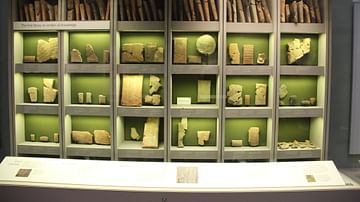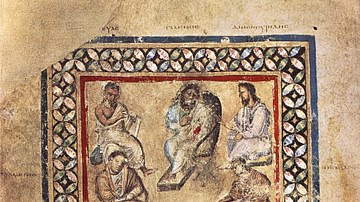Search
Search Results

Definition
Hippocrates
Hippocrates was born on the Greek island of Kos in the 5th century BCE, and he became the most famous physician in antiquity. He established a medical school on the island, wrote many treatises on medical matters, and is, through his systematic...

Definition
Library of Alexandria
The Library of Alexandria was established under the Ptolemaic Dynasty of Egypt (323-30 BCE) and flourished under the patronage of the early kings to become the most famous library of the ancient world, attracting scholars from around the...

Definition
Germ Theory
The germ theory, which emerged in the late 19th century, demonstrated that microscopic germs caused most human infectious diseases. The germs involved included bacteria, viruses, fungi, protozoa, and prions. Louis Pasteur (1822-1895), a French...

Article
A Brief History of Veterinary Medicine
The English word 'veterinarian' as defining one who provides medical care to animals, comes from the Latin verb veheri meaning “to draw” (as in "pull") and was first applied to those who cared for “any animal that works with a yoke” – cattle...

Article
What happened to the Great Library at Alexandria?
Once the largest library in the ancient world, and containing works by the greatest thinkers and writers of antiquity, including Homer, Plato, Socrates and many more, the Library of Alexandria, northern Egypt, is popularly believed to have...

Definition
Library of Pergamon
The Library of Pergamon was established in the city of Pergamon (also Pergamum) by the Attalid King Eumenes II (r. 197-159 BCE) and became the most famous and well-respected center of learning after the Library at Alexandria, Egypt. The library...

Definition
Library of Ashurbanipal
The Library of Ashurbanipal (7th century BCE) is the oldest known systematically organized library in the world, established in Nineveh by the Neo-Assyrian king Ashurbanipal (r. 668-627 BCE) to preserve the history and culture of Mesopotamia...

Definition
Library of Celsus
The Library of Celsus in ancient Ephesus, located in western Turkey, was a repository of over 12,000 scrolls and one of the most impressive buildings in the Roman Empire. Constructed in the 2nd century CE, it was named after the city's former...

Definition
Galen
Galen (129-216 CE) was a Greek physician, author, and philosopher, working in Rome, who influenced both medical theory and practice until the middle of the 17th century CE. Owning a large, personal library, he wrote hundreds of medical treatises...

Video
Galen and Hippocrates - Who were they?
This was the very first video to appear on here, and focussed on the Greek doctor Hippocrates, and the Roman doctor Galen. What exactly did they ever do for us? NOTE: This was based off of content for the GCSE History syllabus provided...